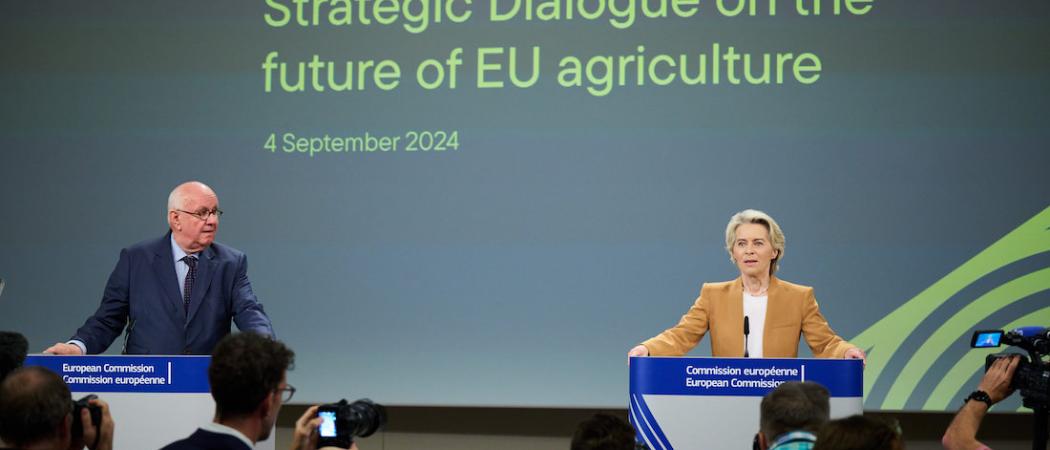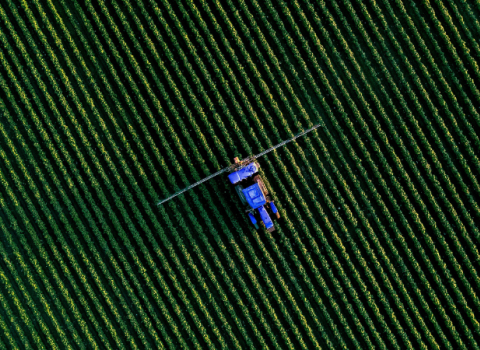More innovation support and public-private partnerships are needed for sustainable food systems, says consensus report

Commission President Ursula von der Leyen presenting the report with her special adviser Peter Strohschneider, former President of the German Research Foundation. Photo: European Union
The EU should work towards more sustainable agri-food systems by increasing research and innovation funding, creating new public-private partnerships and identifying faster regulatory pathways, according to the final report of a forum set up in January to shape a shared vision for farming.
“We must promote a competitive European food value chain,” Commission President Ursula von der Leyen said when the report was published on Wednesday. “For this we must seize all the opportunities offered by the abundance of innovation in this field – from precision farming to drones to new breeding techniques. And not only in large-scale farms but also in cooperatives and in the many SMEs of the sector.”
These recommendations will now feed into a roadmap for agriculture and food, to be presented in the first 100 days of von der Leyen’s new mandate.
The report, drawn up by representatives of 29 industry, academic and environmental groups, sets out ten political principles that should guide EU policymaking, including leveraging innovation and new technologies to support the transition towards more sustainable agri-food systems.
Knowledge and innovations need to be accessible and applicable for farmers and others much faster, for example through open innovation, and by involving end users in the development process, the report says.
Investments and partnerships
Research and innovation in areas including plant breeding, fertilisers, biotechnology, artificial intelligence and new food technologies and products, is of “paramount importance” and the Commission and member states should support innovation hubs, testbeds, living labs and demonstrator farms across the EU.
That would enable farmers, food businesses, technology developers and public authorities to collaborate to pilot and assess the effectiveness of new or existing technologies and knowledge, while showcasing these in real-life settings.
The report calls for a greater proportion of Horizon Europe grants to fund projects developing and testing innovations for sustainable agriculture, food production, and distribution.
Public-private partnerships should be strengthened to facilitate collaboration and to ensure there is adequate funding for basic research. The report specifically recommends that the Commission introduce new partnerships in cluster six of Horizon Europe, which is dedicated to food, bioeconomy, natural resources, agriculture and environment.
It also advocates for incentives, possibly within the Common Agricultural Policy, for the adoption of new technologies such as precision agriculture, sensors, drones, AI and satellite imagery to better utilise resources and manage crops.
In addition to R&I funding and collaboration, the forum recommends streamlining the regulatory process and harmonising standards and certification processes across EU member states.
“The European Commission, the member states, and the European Parliament, together with the European Food Safety Agency, should work together to identify faster regulatory pathways for innovative products and processes clearly focused on increased sustainability,” the report says.
It notes the risks of new innovations and technologies need to be thoroughly assessed before their introduction.
Earlier this year, food start-ups told Science|Business the approval process for innovative meat and dairy alternatives in Europe is long and difficult to predict, and could be improved with more pre-submission advice.
The Commission also wants to relax rules on plants developed using new gene editing techniques such as CRISPR. MEPs adopted their position in February, but the Council is yet to take a stance ahead of trilogue negotiations.
von der Leyen announced the strategic dialogue on the future of EU agriculture in September 2023, in a bid to counter polarisation in the debate around agriculture and sustainability.
Underlining the need for greater consensus, the 29 stakeholders in the forum began their work against a backdrop of widespread farmer protests.
Compromise text
“It’s great to see the report recognise that food innovation can coexist alongside our culinary traditions, as well as acknowledge the importance of boosting research investment – particularly by calling for the Commission to fund public-private partnerships through Horizon Europe,” said Seth Roberts, senior policy manager at nonprofit the Good Food Institute (GFI) Europe.
GFI Europe, which advocates for plant-based and cultivated meat, also welcomed the focus on streamlining regulatory procedures. “While the EU’s novel foods regulation is among the most robust food safety frameworks in the world and is crucial to ensuring consumers can have confidence in new foods, regulators can play an important role in supporting innovation and preventing unnecessary delays by ensuring the process is clear, transparent and harmonised across the EU,” Roberts said.
Industry association EuropaBio, which participated in the forum, welcomed the inclusion of recommendations for advancing the bioeconomy and accelerating the access to market of new technologies and innovations.
While it supports the existing Circular Bio-Based Europe joint undertaking, EuropaBio’s director general, Claire Skentelbery told Science|Business, this covers a broad range of innovations. A new partnership with a more specific focus on the entire agri-food value chain would support the objectives in the report, she said.
The final report is consensus between all 29 participants, from powerful farmers’ lobby Copa-Cogeca, to Greenpeace, which is no small achievement but also represents a fragile coalition.
“It is obvious that not all participants share all the views expressed and all the recommendations put forward in this report. It is very much a compromise text that contains a lot of language offering different angles for interpretation,” said Garlich von Essen, secretary general of seed industry association Euroseeds, which was represented in the strategic dialogue.
“As Euroseeds, we remain convinced that new technologies, innovative products and services hold much potential to enable a truly competitive and sustainable European agri-food sector. Freeing that potential will require concrete policy choices and consequent regulatory action during this new Commission term,” von Essen said.
In May 2020, the Commission presented its Farm to Fork strategy as part of the EU Green Deal, for healthier and more sustainable food systems. This soon came up against farmer opposition and concerns over food security following Russia’s invasion of Ukraine.
Progress has been slow, but with the strategic dialogue, von der Leyen is hoping once again to attack this thorny issue, this time based around a broad consensus.





 A unique international forum for public research organisations and companies to connect their external engagement with strategic interests around their R&D system.
A unique international forum for public research organisations and companies to connect their external engagement with strategic interests around their R&D system.